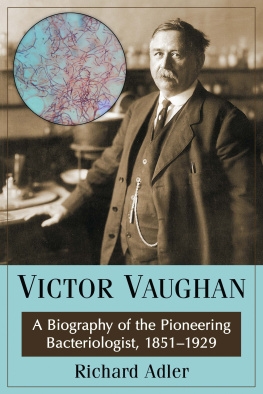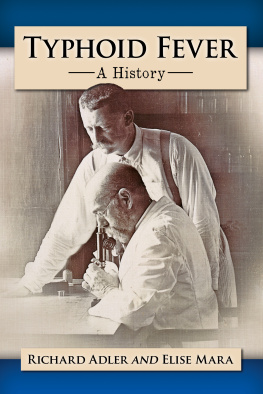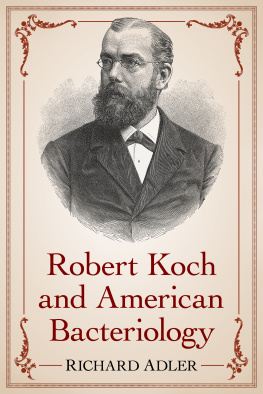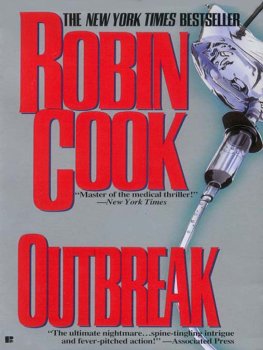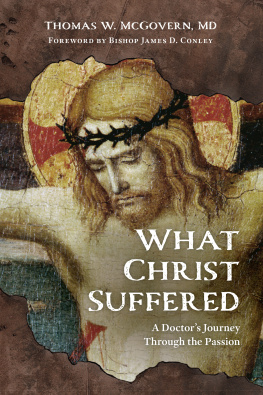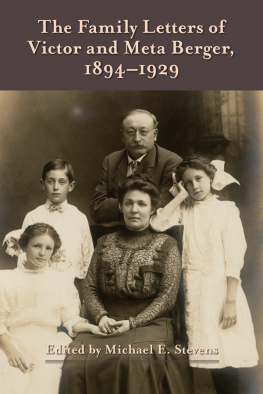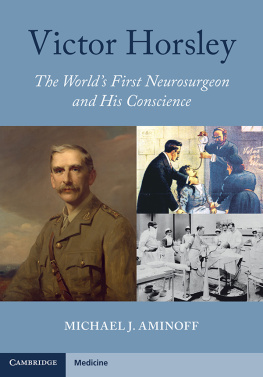
Also by RICHARD ADLER
Cholera in Detroit: A History (McFarland, 2013)
Mack, McGraw and the 1913 Baseball Season (McFarland, 2008)
Victor Vaughan
A Biography of the Pioneering Bacteriologist, 18511929
Richard Adler

McFarland & Company, Inc., Publishers
Jefferson, North Carolina
LIBRARY OF CONGRESS CATALOGUING DATA ARE AVAILABLE
BRITISH LIBRARY CATALOGUING DATA ARE AVAILABLE
e-ISBN: 978-1-4766-1784-8
2015 Richard Adler. All rights reserved
No part of this book may be reproduced or transmitted in any form or by any means, electronic or mechanical, including photocopying or recording, or by any information storage and retrieval system, without permission in writing from the publisher.
On the cover: Dr. Victor Vaughan in his laboratory (Bentley Historical Library, University of Michigan); (inset) bacteria culture (Iceclanl, Wikimedia Commons)
McFarland & Company, Inc., Publishers
Box 611, Jefferson, North Carolina 28640
www.mcfarlandpub.com
Acknowledgments
I would first like to express my appreciation to the staff of the Bentley Historical Library in Ann Arbor for their patience in helping find the location of images and files relevant to the story. The Dearborn campus Office of Research and Sponsored Programs and its director, Dr. Drew Buchanan, were generous in providing funds for purchase of these and other images and related material. I would also like to acknowledge the work of my student, Elise Mara, who possesses an ability, almost unique among undergraduate students, to locate obscure reference material and the patience to do so.
Preface
Though born and raised in a small town in Missouri, Victor Vaughan spent nearly all of his professional life in the college town of Ann Arbor, Michigan. It was here that he earned his three advanced academic degrees: a master of science (1875), doctorate (1876) and a medical degree (1878), as well as an honorary LL.D. (1900), one of four honorary doctor of laws degrees he would receive; he would have additional honorary degrees conferred by numerous other institutions. On the state level, Vaughan was a member of the Michigan State Board of Health for nearly three decades and was elected president during many of those years. On a national level, Vaughan was elected president by both the Association of American Physicians (1908) and by the American Medical Association (AMA) (1914); he served as a member of the House of Delegates, the policy making body for the AMA, from 1902 to 1904 and again in 1906. These were only a sampling of the state and national organizations with which Vaughan was associated during his long career.
But it was during his long tenure at the University of Michigan that Vaughan had his greatest impact. After earning an undergraduate degree at Mount Pleasant College in Missouri in 1872, and teaching Latin and chemistry there for another two years, Vaughan entered the University of Michigan. His decision to enroll there was fortuitous. Residents of a border state during the Civil War, Missourians were split in their support for either the Union or the Confederacy; Vaughans family had been Confederate sympathizers, which meant Vaughan would not be allowed to teach in Missouris public schools. That, and his strong interest in chemistry, led to his applying to Michigan.
Vaughans first job with the university was that of a teaching assistant in chemistry. After earning a masters degree, Vaughan continued with his graduate work in the doctoral program, producing two theses and receiving his Ph.D. in 1876. He continued at Michigan in the medical school, earning his M.D. in 1878. During these years he quickly rose in the teaching ranks: assistant in chemistry (1875) to instructor in medicinal chemistry and lecturer in physiology (1877), lecturer in medicinal chemistry (1879), assistant professor in medicinal chemistry (1880) and full professor of physiological and pathological chemistry as well as associate professor of therapeutics and materia medica in 1883.
As a full member of the faculty in the 1880s, Vaughan established the first hygienic laboratory. This served as the state health laboratory well into the following century, carrying out much of the diagnostic work for the state during the next two decades.
Vaughan maintained a medical practice for many years, but it was in the fields of research and teaching, particularly that of physiological chemistry and its application in the new science of bacteriology, that he had his greatest success. Bacteriology had its beginnings at Michigan during the early 1880s with a course known as Sanitary Science. Vaughan, still working as an assistant professor, was the instructor. Topics included disease germs, physiological ferments and vaccinations. The contents of these courses were new in those early years of bacteriology. The germ theory of diseasethe concept that disease was not the result of emanations from putrefying soil (miasmas), but was the result of an infectious agent, a germwas just beginning to develop.
The emphasis on the role of bacteriagermsand disease was quickly applied by Vaughan in the growing field of public health. As it became increasingly apparent that disease often resulted from bacterial contamination of food or water supplies, Vaughan began investigations into outbreaks of poisoning among consumers of milk and cheese products in the state. Vaughan isolated and identified a poison he called tyrotoxicon, determining that its origin was the result of bacterial putrefaction of stored milk.
The lack of an efficient hygienic laboratory increased the difficulty in solving problems which affected public health, and in 1884 Vaughan began to lobby the state board of health to finance the building of such a laboratory. After several years Vaughans arguments proved successful, and the Hygienic Laboratory was built and functional before the end of the decade; Vaughan became its director.
The field of bacteriology being new during these years, few laboratories existed in the United States where training in bacteriological techniques could be carried out. Taking advantage of the scientific expertise which existed on the European continent, during the summer of 1888 Vaughan traveled to Germany where he had the opportunity to learn techniques firsthand in the laboratory of Robert Koch. Kochs associate Carl Fraenkel provided much of the instruction for Vaughan and his associate from Michigan who was traveling with him, Frederick Novy. The collaboration between Vaughan and Novy would continue for decades even after Novy himself became a prominent member of the scientific community.
In 1891 Vaughan became dean of the University of Michigan Medical School, a position he would hold for three decades. His contributions, both administrative and scientific, would continue to have an impact on the university long after his retirement. While the medical school had grown significantly since its beginnings in 1850 and its standards were among the highest in the nationarguably only those at Johns Hopkins were strongerVaughan quickly implemented the changes which had evolved from his own interest in laboratory work and research. Older faculty, some set in their ways, were eased out over time and replaced by those with strong interests in both teaching and research. Perhaps this emphasis on clinical and laboratory research was among the most significant areas of modernization instituted by Vaughan during this period.
Next page
